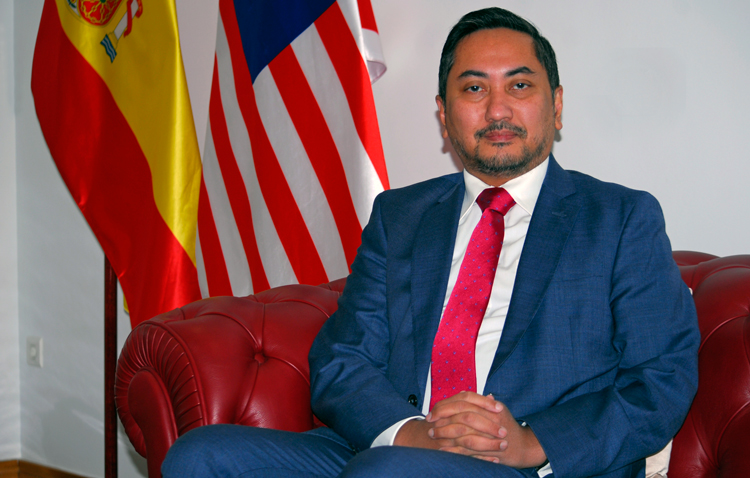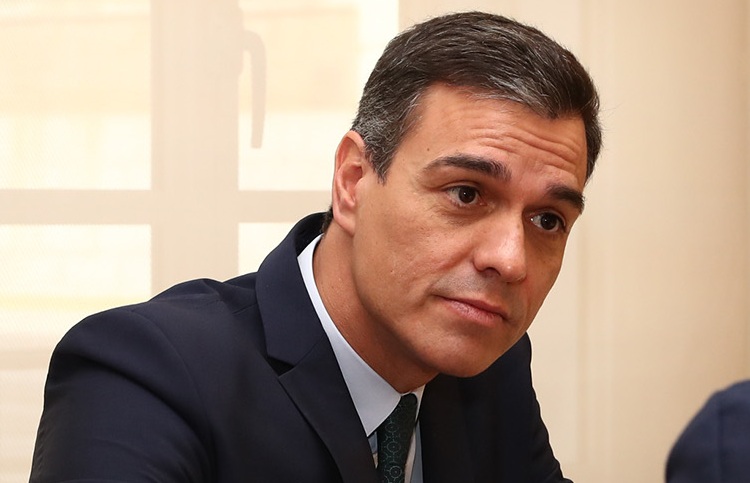Akmal Bin Che Mustafa
Malaysia’s Ambassador
The Diplomat
Spain is his first posting as Malaysia’s ambassador abroad. And he has had to take it on at a very difficult time due to the pandemic, which has disrupted normal diplomatic practices. However, Akmal Bin Che Mustafa believes that “we must adopt and adapt to the new normal and remain resilient, resourceful and dynamic”. In short: “get used to virtual or hybrid format meeting, although I believe that face-to-face meeting is still required and important”.
Malaysia has a very active foreign policy and probably is one of the strongest supporters of multilateralism. What are the benefits of this foreign policy?
We are confronting common challenges therefore it is imperative to address them in a concerted manner through multilateralism. The pandemic is an example of how inter-dependent we are hence a unilateral response is not enough to tackle the problem. Therefore, it is more important than ever not to lose sight of the significance of international cooperation and global solidarity, especially in addressing the severe consequences of Covid-19.
As you rightly put it, Malaysia’s active participation and involvement in the global community remain a consistent theme of its foreign policy. Malaysia is fully committed to multilateralism in advancing global peace, security and prosperity through active participation in the deliberations and efforts toward finding solutions to various global issues.
Malaysia’s Ministry of Foreign Affairs just recently launched its strategic plan for 2021-2025. Can you share with us about this latest initiative?
This strategic plan will continue as a framework outlining Malaysia’s vision and mission of its external relations and foreign policy in the post-pandemic era. The aspirations are clear – the nurturing, strengthening and consolidating of bilateral and multilateral relations as well as reaffirming ASEAN as the cornerstone of Malaysia’s foreign policy owing to various critical factors including its geographical proximity and geopolitical strategic interest to the nation. Furthermore, this strategic plan will run parallel with domestic and global economic recovery and restructuring efforts, ultimately reflecting the ambitions and expectations of the foreign ministry in exemplifying Malaysia’s role as a responsible, steadfast and effective partner.
Malaysia have strengthened its cooperation with other countries, such as Turkey and Pakistan, to fight Islamophobia. What is the perception of Islamophobia?
Islamophobia is a fear, or more precisely, an excessive fear, against Islam, against Muslims, as well as against anything associated with the religion. It rests in the mind and it reflects in attitudes, and could be manifested through violent actions.
As a multi-ethnic and multi-cultural nation, the rich mix of ethnicity and religions is most vividly displayed in Malaysia where its large Muslim population live alongside people of other religions including Buddhists, Christians and Hindus.
Intercultural and interfaith dialogue would help in creating mutual understanding and conveying the true teachings of Islam as a religion of peace. Embracing moderation is also an important value as it comes with a high degree of tolerance and trust.
What has membership of ASEAN brought to your country so far? Do you think that ASEAN can eventually evolve towards greater political, economic and fiscal union, as the European Union has done?
ASEAN remains the cornerstone of Malaysia’s foreign policy and the establishment of the ASEAN Community in 2015 has significantly elevated Malaysia’s approach and engagement at the regional level. Since its establishment in 1967, ASEAN has made many achievements to become a dynamic economic community in the Asia-Pacific region.
In comparison with the European Union, both are regional organisations with legal personalities. While they share similar visions to promote peace and seek to deepen integration process, both organisations also have different characteristics, principles and legal framework. As ASEAN accelerates the unifying process, ASEAN do not necessarily have to learn and apply fully EU institutions but need to study selectively the conditions suitable to its circumstances.
I would also like to highlight that ASEAN and the EU has upgraded its relationship to a strategic partnership on 1 December 2020, after 44 years of formal partnership. The ASEAN-EU strategic partnership can best be regarded as a consolidation of the range of cooperative arrangements and shared objectives, which has expanded to many different fields such as sustainability, connectivity, innovation and gender-equality.
The European Union is Malaysia’s fourth largest trading partner while your country is the EU’s 23rd largest supplier. Do you hope to improve this relationship? In which sectors can you make progress in bilateral trade?
I understand that strengthening trade and investment links remains Spain’s top priority in Asia Pacific region. In this respect, Spanish companies may consider Malaysia as gateway to the region as the government is undertaking major initiatives to drive investments into country such as easing operating of businesses through digitalising selected government services, providing tax incentives for the pharmaceutical and services sectors, and implementation of a One Stop Centre (OSC) to facilitate the entry of business travelers into the country.
The region also made a historic milestone with the signing of Regional Comprehensive Economic Partnership Agreement (RCEP) in November 2020. With 15 signatories, RCEP represents a market of 2.2 billion people and a combined GDP of US$26.2 trillion. As RCEP member, Malaysia provides a regional platform for external businesses to tap into the largest free trade agreement in the world.
The same is true on the investment side, where the EU as a whole is the largest foreign investor. Do you think the economic relationship could be even better if both sides had a Free Trade Agreement, for example? (The 1980 EU-ASEAN Cooperation Agreement is currently in force).
The Free Trade Agreement is certainly an important element to promote trade and investment between Malaysia and the EU member states. Negotiations for a Free Trade Agreement (FTA) between the EU and Malaysia were launched in 2010 and put on hold temporarily to give opportunity for both sides to have a stocktaking exercise to assess the prospect to resume negotiations. We look forward to resuming the negotiation in the near future.
The difficulties are focused on EU’s plan to draw up a new directive on renewable energy (RED II), which would directly affect palm oil as a biofuel. Are there any new developments in this area?
Efforts have been undertaken to address the concerns of the EU on sustainability and deforestation. One of the key initiatives is the launching of the Malaysian Sustainable Palm Oil (MSPO) Certification Scheme in 2015. MSPO certification addresses the environmental, social and economic aspects of palm oil production. MSPO certification covers all aspects of palm oil production, from the field to the final product. MSPO has been made mandatory by the end 2019, ensuring that all oil palm plantations, independent and organised smallholdings, and palm oil processing facilities in Malaysia to be certified in line with the requirements of the MSPO Standards.
As for bilateral relations with Spain, although they are developed within the framework of the EU, it can be said that they have gained significant momentum in recent years. Do you think that this economic relationship has room for further development?
Spanish investments in Malaysia is present in various sectors such as oil and gas, IT solutions, steel industry, petrochemical and machinery. I believe that greater collaboration between the two countries would further open Malaysia’s private sector to tap into Spain’s advanced technological expertise. As the country moves towards strategic diversification, particularly in high-value products and high-end services, Malaysia offers vast opportunities for Spanish investments in high-quality machinery and equipment, aerospace, green technology, automotive technologies, and industrial design. I would also like to encourage Spanish investors to leverage their technological expertise to help facilitate Malaysia’s digital economy, which is projected to grow by 21 per cent between 2020 and 2025, reaching an estimated US$30 billion gross merchandise value (GMV) by 2025.
Malaysia could also leverage on her established and world-renowned halal standard and certification as well as strong and robust Islamic financing system to further amplify her presence in Spain. Due to the connectivity and its special relationship with Latin American and Mediterranean countries, there is enormous opportunity for Spain to be the regional hub.
In addition to the traditional dimension of economic cooperation, the cooperation prospects have evolved to encompass collaboration in education, science and technology, culture and tourism as well as the intensification of people-to-people contact.







